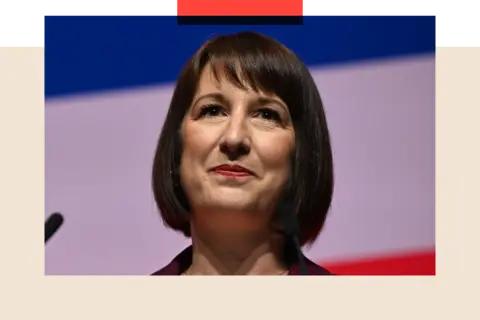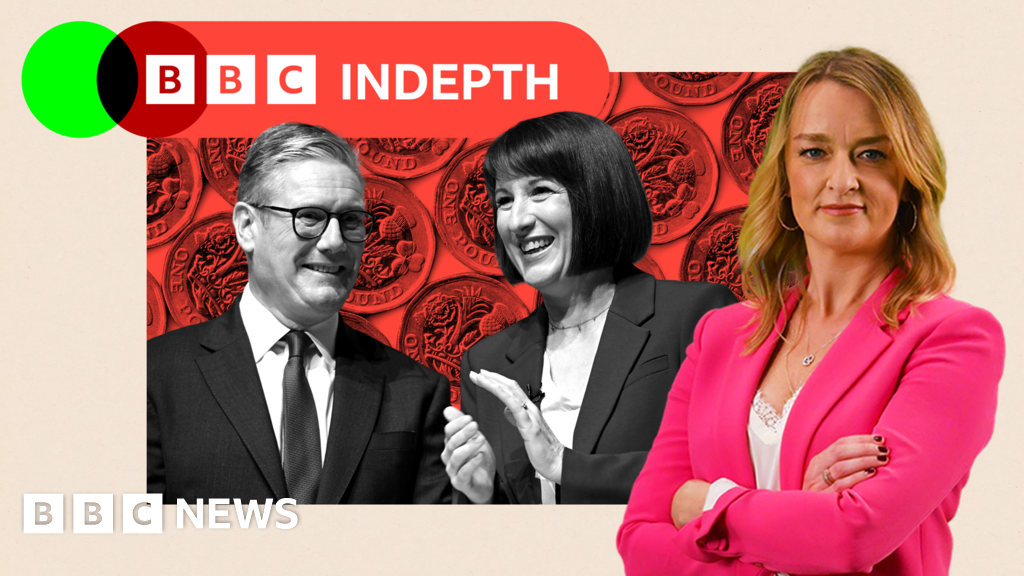 BBC
BBC“This is it. This is what it’s all for.” In four days Rachel Reeves will stand outside No 11 holding the red Budget box up for hordes of press snappers. That moment really will be, as a prominent party figure suggested, a massive moment for Labour – and for the country.
On Wednesday, the new government will reveal more about itself than ever before. We’ll know how much tax we’ll all pay, how much cash the government will spend and borrow, and the mighty financial markets will know in detail how the chancellor is changing the rules designed to prevent a public finance meltdown.
“Budgets are a moment when the government actually has control,” one minister says.
There have been deliberate warnings for months about how tight cash is – how No 11 needs to squeeze the public purse to make ends meet.
But others in the Labour movement hope for much more than just a “Treasury budget” driven by balancing the books. They instead want a “Labour budget” – to seize the moment and prioritise public services.
As one insider hopes, “if you’re going to have a Labour government, let’s have a Labour government, not a Treasury government”.
It’s a difficult balance, and the government’s attempt to seed expectations may have confused some of the public, a senior MP tells me. “Random members of the public reading it all think, ‘Oh gosh, life is collapsing, the socialist government is taking all our money,’ or you read something else and think, ‘it’s all going to be OK’.”
You can read more about the plans we know about here, including Rachel Reeves’ big, planned announcement to change how the country’s enormous public debts are counted.
But what will it add up to? What will Labour do with its moment of control?
A big bazooka Budget
The strapline of the Budget will be “fixing the foundations to deliver change” – not exactly the snappiest slogan in history.
But “fixing the foundations” is fast becoming a very familiar mantra right across Labour, heard in soundbites, on social media, and in speeches galore – the government’s asking for patience from the public to sort out some deep-rooted problems in the country.
And the scale of this Budget is likely to be huge. There is no doubt it will include a major set of measures amounting to billions and billions of pounds of extra tax rises like the hike in National Insurance for employers we’ve confirmed today; billions and billions of pounds of extra borrowing.
A government source said: “It is a big budget because there is a hell of a lot to do to get finances back on firmer footing, and to make sure public services can keep going.”
But note the “to deliver change” in the Budget strapline as an add on – a sign – that the chancellor is under pressure to spell out what the point of tax rises are, what the merits of squeezing some spending is.
If you put up with the pain, what do you get in return?
That pressure is behind the chancellor’s decision to flex the spending rules she used to boast about being “ironclad”. She wants billions to spend on roads, rail, to invest, in the hope of getting the economy growing – and extra spending on the health service and also, likely, for schools.
We’ll hear more about that tomorrow with Education Secretary Bridget Philipson joining us on the show.
As well as a big Budget in monetary terms, it’s a big moment in history too. The first Budget of a government with a gravity-defying majority. The first delivered by a female chancellor. And the first Labour Budget in 15 years.
 Getty Images
Getty ImagesA corrective Budget?
Aside from the huge price tag, there’s the purpose.
The narrative inside government is that this is a “corrective” moment – essentially, cleaning up the damage done to the public finances by the pandemic, the energy shock, and what Labour would claim were damaging Tory decisions and “covering up” how bad things were in the run up to the summer’s General Election.
As you’d expect, Conservatives would argue that the economy had started to turn for the better before they lost – but the independent OBR has said the extent of the problems had been masked.
A “corrective” certainly sounds like something painful. Sources point to two previous Budgets after big moments of economic peril – the Norman Lamont Budget of 1993 after the disaster of Black Wednesday and George Osborne’s 2010 emergency budget after the turmoil of the financial crisis. Both of those Budgets were notable for tax rises. This one won’t be different.
Those “corrections”, along with any big cheques that are written for health, schools or housing, will form the basis of Labour’s narrative.
The message they want the public to hear is clear: things went badly wrong, and it’s not going to be easy or cheap to fix them.
Government sources even pitch this moment as a “last chance” after what they say are years of neglecting public services and running the country’s debt up to sort things out.
Reeves will present it as a political choice, a conscious decision that contrasts to the Conservatives’ record.
“Investment not decline… stability and an end to chaos.” One of her allies told me the Budget would be “political, political, political”, choosing every opportunity to highlight the differences in her approach to the many Tory chancellors in her place before.
A political Budget?
That will be Reeves’ argument – but how it lands with the party and public matters so much.
And there are nerves in some quarters of the Labour Party, with some ministers very worried about how amount of cash they will have to spend. One senior source says, “no return to some form of austerity, that is the acid test – we all understand the inheritance, but there are different ways of raising money”.
As with any Budget, as one MP says, “we all have a shopping list”, and every squeeze on spending will have an accompanying howl of: how could you?
Budgets can create new problems just as they can solve them.
Skimping on the cash for hard-pressed local councils would cause alarm. Scrapping the £2 cap on bus fares would provoke outrage outside London. Raiding the research budget in the science department would cause upset. What about funding for the dental profession when the government is committed to 700,000 extra dental appointments?
Every decision has potential pitfalls.
A risk of upset, outrage – and even industrial action. A letter passed to the BBC from the Fire Brigades Union to Reeves is demanding a fair settlement for the Fire Service after years of pressure, dangling the possibility of industrial action if it doesn’t happen. There’s even a risk of strikes among pharmacies over funding, and the Royal College of Nurses has rejected ministers’ pay offers so far.
That’s just a short pick of the very long list of dilemmas where money talks, and the chancellor’s been urged to listen.
‘Escape the doom loop’
Downing Street, both No 10 and 11, hope they can pull off a huge coup this week – to tell the public things will be hard for a while, but convince them that a better country is on the way; that higher taxes will be well spent, public services will get up off their knees, the economy will grow and we’ll all have a stake in it.
There remain competing views about how to achieve that. Some are adamant that “it will be the Labour Budget the whole country’s been waiting for… to escape the doom loop of high taxes, low growth and poor public services”.
But even inside the party there’s scepticism about whether they can make it happen – a fear that No 11’s drive to balance the books, even with changed rules, will take over, preventing a bolder and cheerier message from ringing out at a huge moment.
Reeves and Sir Keir Starmer are fond of saying their number one priority is to grow the economy – and one source says it will not be “a Labour Budget or a Treasury budget, but a Rachel Reeves budget”.
One senior figure fears that the “Treasury sees its number one mission as controlling public spending – not creating growth,” citing no difference between the Treasury under Jeremy Hunt and No 11 under Rachel Reeves.
A Labour source says that “if it is a Treasury Budget, a technocrat one that focuses more on anything else on balancing the books, then it would be a let down”.
Another jokes the plans are “52% Labour, 48% Treasury”, as the party has just been on the side of managing to stick to its political instincts, not the traditional money-saving drive of No 11.
And what about the Budget tradition of a “rabbit out of the hat” – a nice surprise at the end of the statement?
Not this time. I’m told a group of Labour staffers is eagerly holding a sweepstake about what it could be – but a source suggests, in a bleak financial situation, they stand to be sorely disappointed. “There won’t be any rabbit, it’d be like Watership Down for the poor little sod.”
Labour waited and worked a long time to get back into power. And Rachel Reeves has waited a long time for this moment, to give a Budget statement as chancellor in her dream job. The girl who saved her 20p holiday money, rather than spend it at the toy shop, now in deciding what to save and spend for us all.
But the beginning of her and Sir Keir Starmer’s story in government has not been the one they dreamt of.
This week is, according to a Labour source, “a golden opportunity to relaunch themselves”.
Where the balance lands in Reeves’ big moment could hardly be more significant.
Everyone in government understands as this source says: “We absolutely know it is the defining moment for the party and our government, this is it.”


BBC InDepth is the new home on the website and app for the best analysis and expertise from our top journalists. Under a distinctive new brand, we’ll bring you fresh perspectives that challenge assumptions, and deep reporting on the biggest issues to help you make sense of a complex world. And we’ll be showcasing thought-provoking content from across BBC Sounds and iPlayer too. We’re starting small but thinking big, and we want to know what you think – you can send us your feedback by clicking on the button below.


